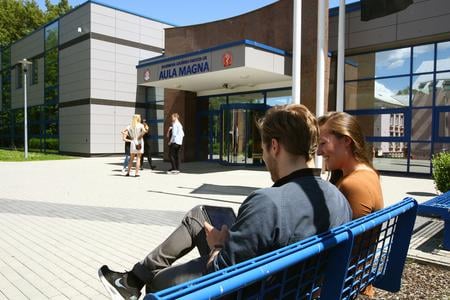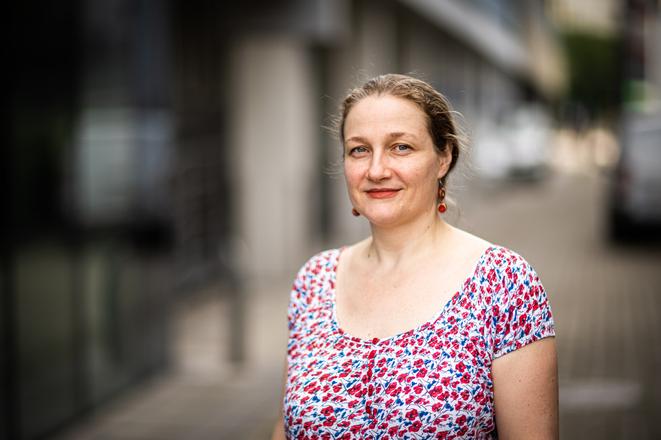While 20 percent of Slovak students study at universities abroad, the average for countries in the Organisation for Economic Co-operation and Development (OECD), a club of industrialised countries, is 2 percent; among EU member states it is 4 percent. A new survey of more than 600 high school graduates has shown their motivations and reasons for leaving, but also why they stay in Slovakia. The survey was conducted by the Focus polling agency for the Therapolis civic association between late June and early July 2024, i.e. when most of the respondents had already been accepted to universities.
“However, both groups (students at home and abroad) are united by their interest in establishing themselves on the labour market after school,” said Renáta Hall, an expert on universities, in an interview for the Sme daily.
You will read in the interview
who are the students who leave Slovakia
why it is not advisable to rely entirely on rankings
what universities could do to attract students
what the survey shows about the motivation of future university students who want to study abroad
What did the survey show about the motivation of future university students who want to study abroad?
Although it turns out that for those who remain studying in Slovakia, proximity to family is a strong motivator, this is also true to some extent for those who go to university in the Czech Republic.
A significant difference between these groups is the focus on the academic quality of education. This is also reflected in the fact that they are more often interested in the quality of research and artistic activities than those who stay here. However, both groups share an interest in post-school careers.
What are the motivations of those who stay?
For them, it is important to build the country in some way. They may have stronger relational links to family and friends.
What might persuade departing students to stay?
There are several things. One is to improve quality – so more innovative forms of education and content, in the sense of combining different disciplines in one study programme, for example, medicine and management or law. Such a combination would help doctors who often set up private practices.
There is also the issue of better facilities for universities. It is not just about dormitories, but especially about equipment for teaching. Ironically, those who stayed talked less about the dorms, but I think the reason was that they lived closer to the school than those who left and didn’t seem to need the dorms.
There is also a wider context behind pupils leaving, namely the setting of society. They miss specific things about it and are more critical of its lack of openness or the democratic functioning of its institutions.

World university rankings also influenced the decision of the students in your survey. However, the change in quality only becomes apparent after a few years. How are schools supposed to prove that they are of high quality, when that is not yet captured by the rankings?
Rankings should be taken with a pinch of salt. Applicants should understand the limitations of rankings and understand that they are not 100-percent accurate.
The ones we gave students to choose from were the Shanghai Ranking (also Academic Ranking of World Universities, or ARWU), the World University Rankings (also Times Higher Education Ranking) and the QS World University Ranking; the last two, especially, are built primarily on reputation, which stems from their perception by researchers and practitioners.
Renáta Hall
Led the To Dá Rozum (Learning Makes Sense) project, in which she investigated the state of Slovak education
Currently the Executive Director of the Therapolis Centre of Excellence
Has also worked at the Slovak Accreditation Agency for Higher Education
Was an advisor to Prime Ministers Iveta Radičová (2010-2012) and Eduard Heger (2021-23) on higher education
It’s not about someone saying that something is fine, but that those people are also known in real life in science and education, are successful and have collaborations out in the world. To some extent, this can influence the rankings faster than by increasing the impact of improved-quality scientific outputs, which takes considerably longer.
I know of schools in our area that are planning to communicate with the compilers of the rankings. Abroad, those that want to score well are already communicating with them. It is all about providing the best quality data about the school.
What was particularly surprising to me was that students staying in Slovakia are also looking at them, as only seven of our universities are ranked in them.
Students going abroad are not persuaded by classmates or teachers, but rather by family, friends and acquaintances who have already studied at a Slovak university. Shouldn’t the marketing of universities focus more on these groups and on making current students feel better?
It would be a very short-term strategy, just to attract someone to stay, when everything is open today and there are many possibilities. Also, a well-known marketing dictum says that the most powerful tool is “word of mouth”.
Thus, a strong influence here is the real experience with our system and this experience needs to be improved. It is very encouraging that the highest proportion of pupils make their decisions based on the opinion of people who have experience of studying in Slovakia.
Where do you see room for improvement in universities?
One aspect is the relatively heavy load from a wide range of subjects. So, students have no real opportunity and time to immerse themselves in them. We’re dealing with teachers having classes rather than students getting something out of them. There needs to be more of a pivot of education to what is good for the student and not what is easiest for the university.
So the first step is to take their feedback and realistically work with it. Workplaces have different needs and issues, and it is important to analyse and then apply these yourself.
In the survey, you also touched on the issue of the master’s, or second level of education at universities. Almost half (42 percent) of prospective undergraduates plan to go abroad to study for a master’s degree or an engineering degree. At the same time, it appears that students would like to have a greater connection with practice. Can they get their wish?
Higher education can be diverse. In Slovakia; massification (Ed. note – the transition from elite to mass education in universities) in the 2000s was not accompanied by diversification. This means that we wanted to ‘inflate’ university education as a whole; it just doesn’t quite work that way.
However, in my opinion, it is legitimate to expect and want the second degree to be more connected with practice. This is not yet a possibility in Slovakia, but it should be considered, because pupils are also applying to vocational schools abroad, where they spend more time in practice than in school during their second degree.
However, academic work can also be more closely linked to practice. For example, you learn research by doing it, not just talking about it in theory.
What will you do with these findings?
I will present them further. The Education Policy Institute, which is part of the Education Ministry and with which we have cooperated, also has this data. This is because they observed some change in the administrative data and wanted to obtain more information about them.
The plan is also to compile the results into a scientific publication.
At the same time, we have published raw data that can be used in statistical analysis. I will consider it a success if the data is used as widely as possible and improvements are made on the basis of it.
© Sme

 Renáta Hall (source: Sme - Marko Erd)
Renáta Hall (source: Sme - Marko Erd)